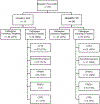Impact of genetic testing and smoking on the distribution of risk factors in patients with recurrent acute and chronic pancreatitis
- PMID: 34663162
- PMCID: PMC9278560
- DOI: 10.1080/00365521.2021.1984573
Impact of genetic testing and smoking on the distribution of risk factors in patients with recurrent acute and chronic pancreatitis
Abstract
Objective: The aim of the present study is to assess the impact of smoking dose and duration on the distribution of risk factor(s) in patients with RAP and CP, and the impact of genetic testing on the distribution of risk factor(s) in patients with idiopathic RAP and CP.
Methods: All adult patients with RAP and CP referred to a multidisciplinary pancreatitis clinic between 2010 and 2017 were evaluated. Risk factors included alcohol and smoking, hypertriglyceridemia, biliary, and other etiologies. Genetic testing was only pursued in patients with idiopathic RAP or CP.
Results: Among the 1770 patients evaluated, 167 had RAP and 303 had CP. After genetic testing and smoking, the most common risk factors for RAP and CP were pathogenic variant(s) (23%) and the combination of alcohol and smoking (23%), respectively. Genetic testing and smoking assessment decreased the proportion of patients with alcoholic RAP from 17% to 5%, alcoholic CP from 33% to 10%, idiopathic RAP from 49% to 12%, and idiopathic CP from 54% to 14%. Pathogenic CFTR variants were the most common variant in patients with RAP (51%) and CP (43%). Among the 68 patients with pancreas divisum, other risk factor(s) were identified in 72%.
Conclusion: Genetic testing and a detailed assessment of smoking dose and duration reduce the proportion of patients with alcoholic and idiopathic pancreatitis. Other risk factor(s) for pancreatitis are found in the majority of patients with pancreas divisum further questioning its role as an independent risk factor.1. What is the current knowledge?Approximately 30% of patients with pancreatitis have no clear risk factor(s) and are categorized as having an idiopathic etiology.Pathogenic variant(s) as well as smoking dose and duration are well-established risk factors for recurrent acute and chronic pancreatitis but are not widely recognized or incorporated into clinical practice.2. What is new here?Genetic testing and a detailed assessment of smoking dose and duration reduced the proportion of patients with alcoholic and idiopathic acute recurrent and chronic pancreatitis.Approximately three-fourths of patients with pancreas divisum have a risk factor for pancreatitis.
Keywords: Recurrent acute pancreatitis; chronic pancreatitis; genetic testing; risk factors; smoking.
Conflict of interest statement
Disclosure statement
E. A. is a medical advisory board participant for Nestle Health Science. V. K. S. is a consultant for AbbVie and Nestle Health Science; medical advisory board participant for Cook Medical, and receives grant support from Orgenesis, Theraly, and AbbVie. M. K. is a consultant for BSCI, Medtronic, Olympus, and GI Supply. These financial interests do not pertain directly to this work. For the remaining authors, no conflict of interest was declared.
Figures





Similar articles
-
The Common Chymotrypsinogen C (CTRC) Variant G60G (C.180T) Increases Risk of Chronic Pancreatitis But Not Recurrent Acute Pancreatitis in a North American Population.Clin Transl Gastroenterol. 2015 Jan 8;6(1):e68. doi: 10.1038/ctg.2014.13. Clin Transl Gastroenterol. 2015. PMID: 25569187 Free PMC article.
-
Recurrent Acute Pancreatitis: Current Concepts in the Diagnosis and Management.Curr Treat Options Gastroenterol. 2018 Dec;16(4):449-465. doi: 10.1007/s11938-018-0196-9. Curr Treat Options Gastroenterol. 2018. PMID: 30232693 Review.
-
Risk of Recurrent Pancreatitis and Progression to Chronic Pancreatitis After a First Episode of Acute Pancreatitis.Clin Gastroenterol Hepatol. 2016 May;14(5):738-46. doi: 10.1016/j.cgh.2015.12.040. Epub 2016 Jan 6. Clin Gastroenterol Hepatol. 2016. PMID: 26772149
-
Alcohol consumption, cigarette smoking, and the risk of recurrent acute and chronic pancreatitis.Arch Intern Med. 2009 Jun 8;169(11):1035-45. doi: 10.1001/archinternmed.2009.125. Arch Intern Med. 2009. PMID: 19506173 Free PMC article.
-
Central role of the sentinel acute pancreatitis event (SAPE) model in understanding recurrent acute pancreatitis (RAP): Implications for precision medicine.Front Pediatr. 2022 Aug 15;10:941852. doi: 10.3389/fped.2022.941852. eCollection 2022. Front Pediatr. 2022. PMID: 36046477 Free PMC article. Review.
Cited by
-
Turkish Society of Gastroenterology: Pancreas Working Group, Acute Pancreatitis Committee Consensus Report.Turk J Gastroenterol. 2024 Nov 11;35(Suppl 1):S1-S44. doi: 10.5152/tjg.2024.24392. Turk J Gastroenterol. 2024. PMID: 39599919 Free PMC article. Review.
-
Germline multigene panel testing in acute and chronic pancreatitis.PLoS One. 2024 Aug 22;19(8):e0307076. doi: 10.1371/journal.pone.0307076. eCollection 2024. PLoS One. 2024. PMID: 39172977 Free PMC article.
References
-
- Keller J, Layer P. Idiopathic chronic pancreatitis. Best Pract Res Clin Gastroenterol. 2008;22(1):105–113. - PubMed
-
- Chang MC, Su CH, Sun MS, et al. Etiology of acute pancreatitis – a multi-center study in Taiwan. Hepatogastroenterology. 2003;50:1655–1657. - PubMed
-
- Garg PK, Tandon RK. Survey on chronic pancreatitis in the Asia-Pacific region. J Gastroenterol Hepatol. 2004;19(9):998–1004. - PubMed
MeSH terms
Grants and funding
LinkOut - more resources
Full Text Sources
Miscellaneous
